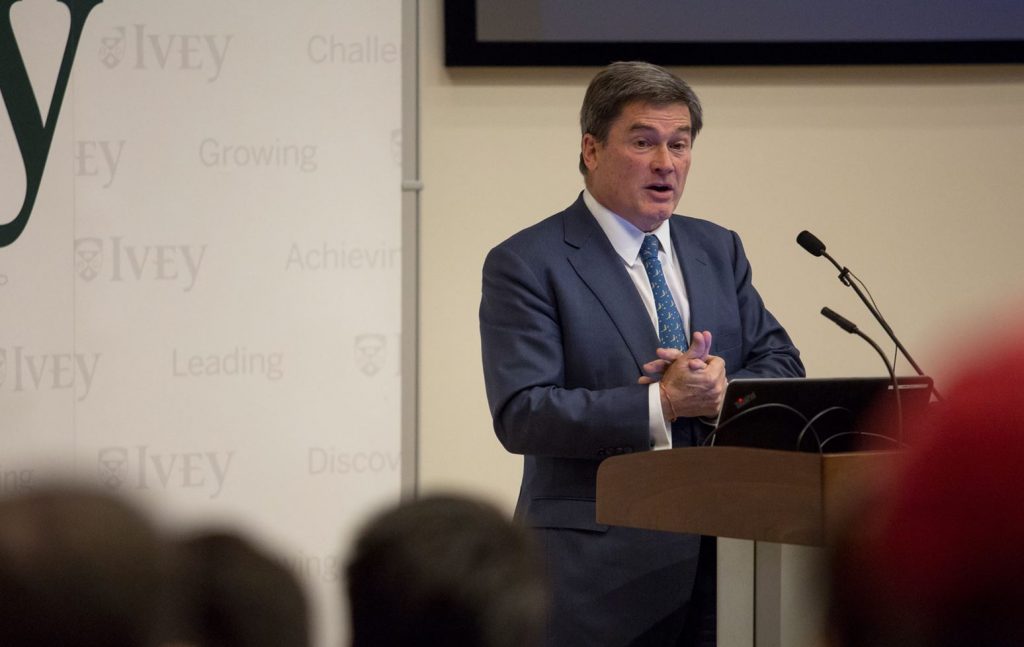Rotman Receives $6 Million Endowment, and More – Toronto News

This week, some of Toronto’s most prominent business schools have seen a wealth of exciting news (including actual wealth in Rotman’s case, in the form of a sizeable donation). We’ve rounded up some of the most exciting recent news from Toronto metro’s business schools.
Private Donations Give Specialty Programs a Shot in the Arm – The Globe and Mail
Over 20 years since the University of Toronto received a $15 million donation from the Rotman family, changing its name from the Faculty of Management to the current Rotman School of Management, the philanthropic family once again returned a sizable gift to the Toronto business school.
The new $6 million donation will boost the school’s healthcare management programs, according to the Globe and Mail. As well, the family gifted the school an additional $1 million to help “the reach of an award-winning program for Indigenous entrepreneurs.”
“The latest Rotman family donation is earmarked for three initiatives: recruitment of three faculty research chairs in artificial intelligence, life sciences commercialization and health economics and policy; scholarships for graduate students in health care management studies; and support for a new global executive MBA for health care and life sciences.”
You can learn more about the Rotmans’ donation here.
Schulich Researchers Analyze Canada’s Multicultural Marketplace – yFile
A new York University Schulich School of Business study from professors Ela Veresiu and Markus Giesler—“Beyond Acculturation: Multiculturalism and the Institutional Shaping of an Ethnic Consumer Subject”—found that “that Canada’s market-based form of multiculturalism fosters marketplace inclusion without resource redistribution, and maintains ethnic divides rather than uniting diverse communities.”
“We bring sociological theories of neoliberal governmentality and multiculturalism to bear on an in-depth analysis of the contemporary Canadian marketplace to reveal our concept of market-mediated multiculturation, which we define as an institutional mechanism for attenuating ethnic group conflicts through which immigrant-receiving cultures fetishize strangers and their strangeness in their commodification of differences, and the existence of inequalities between ethnicities is occluded,” said Veresiu.
You can read more about Veresiu and Giesler’s study here.
Investing Insights: Lessons from Tom Russo – Ivey Blog
Last month, Tom Russo, managing member of Pennsylvania investment firm Gardner Russo & Gardner, spoke with professor George Athanassakos’ value investing class at the Ivey Business School about his company’s investment philosophy, which broke down into three principles.

Gardner Russo & Gardner managing member Tom Russo / Photo via ivey.uwo.ca
- The capacity to invest
- The capacity to suffer
- The capacity do nothing
“Despite the long-term unattractiveness of holding cash, doing nothing may sometimes prove to be the right decision to make,” HBA and Computer Science dual degree candidate Leroi Yu writes on the Ivey Business School blog. Sitting on the sidelines instead of compromising on quality takes character. It provides optionality and may prove to be beneficial in the long-run.”
You can read more about Russo’s advice here.
New Ryerson University Research Finds Immigrants Take Greater Business Risks

A new study from the Ted Rogers School of Management at Ryerson University investigates the role immigrant entrepreneurs play in global markets, finding that greater business risk does isn’t always worth the reward.
Kings of the North: Should You Get a Part-Time MBA in Chicago or Toronto?

In many ways, Chicago and Toronto are very similar world class cities: Both are situated on a Great Lake, host an “Original Six” hockey team, and both metros suffer from “second city” inferiority complexes. Both metros also have plenty of competitive business school options for professionals who want to earn an MBA. Continue reading…
Ted Rogers Dean Advocates Closing the Gender Gap by Engaging Men

Dr. Stephen Murphy, dean of the Ted Rogers School of Management at Ryerson University, recently shared his thoughts on the gender gap in business with The Globe and Mail, following a visit from Catalyst Canada.
In October, Tanya van Biesen, Executive Director of Catalyst Canada, recently visited the Ted Rogers School of Management to discuss gender inequality with current MBA students. Founded in 1962, Catalyst Canada has been working for more than fifty years to build welcoming workplaces for women by providing the necessary research, tools, and solutions to create leadership roles for women. “Gender inequality is not a women’s issue, it’s society’s issue,” van Biesen told Ryerson MBA students.
Dean Murphy agrees. “The gender gap is everyone’s problem,” he told The Globe and Mail, noting that only 68 of 142 countries increased their gender gap score throughout the past year, while 74 countries actually moved backwards. According to Murphy, a crucial part in reducing the gender gap lies in not just engaging women—but also men.
In Canada, women hold just 19 percent of S&P 500 board seats. Yet despite constant evidence revealing the benefits of gender and racial diversity in the workplace, 27 percent of directors in a recent survey (97 percent of whom were men) said there was an unnecessary amount of attention placed on gender diversity.
While many organizations and initiatives, such as HeForShe, exist to try to close this gap, dean Murphy emphasizes how important it is for men within a company to also see the importance of reducing the gender gap. At companies like PwC—which was able to increase the number of women in their global leadership team from 8 percent to 47 percent—training involves a discussion of the implicit biases that may lead to gender discrimination.
“Educating leaders on implicit and explicit bias is key to cracking the diversity nut,” Murphy said.
You can read the rest of his article in The Globe & Mail here.
Finding The Best Toronto Accelerated MBA Programs

One-Year or Accelerated MBA programs give students the opportunity to gain the strong business foundation of an MBA education in half the time as a traditional MBA. Students in accelerated MBA programs can also reduce the overall cost of their degree while also minimizing the amount of time spent without earning a full-time income.
Last summer, we took a look at some of the city’s best accelerated program offerings. However, we have updated our overview, including more of our favorite Toronto school’s with uniquely exciting accelerated programs.
The Toronto Accelerated MBA Programs You Need To Know
Schulich School of Business – York University
The Accelerated MBA at York University’s Schulich School of Business gives students the chance to dive straight into the second year of their degree program. With the option to pursue the degree either full or part-time, students can complete the Schulich MBA in as little as eight months. The program is reserved for students who have completed either a BBA or BCom degree in Canada within the past ten years that is similar in structure to the BBA at Schulich, but students without this requirement may still be eligible for some form of accelerated degree.
DeGroote School of Business – McMaster University
The Accelerated MBA at the McMaster University DeGroote School of Business can be completed in as little as eight months if pursued on a full-time basis. Students in the accelerated program are exempt from first year MBA courses and will only pay half the tuition of the two-year program. The accelerated program is designed for students who earned an undergraduate business degree in the last ten years, maintained at least a B average in the final two years of their undergraduate degree, and have at least one year of professional work experience.
YOU MIGHT ALSO LIKE: Canada’s MBA Programs are Rising
Ivey Business School – Western University Canada
The One-Year accelerated MBA program at the Ivey Business School at Western University Canada is designed for ambitious students who want to further develop their leadership ability and accelerate their career. The Ivey MBA gives students real-world experiences through global learning opportunities and projects that provide hands-on business practice. The Ivey curriculum is centered around a unique case study method, which uses over 300 cases each year to allow students to practice real business challenges.
Rotman School of Management – University of Toronto
For advanced business school students with more professional experience, the Rotman School of Management at the University of Toronto offers a uniquely inviting One-Year Executive MBA; perfect for upper level managers looking to further develop their skills in management, decision-making and leadership. Within 13 months, the EMBA will provide students with hands-on leadership experience designed to change the way MBAs approach business and make decisions. The degree is also designed work around a student’s career, providing the opportunity for students to constantly be applying their education outside of the classroom.
Ted Rogers School of Management – Ryerson University
At Ryerson University’s Ted Rogers School of Management, students can select from a number of different formats in which to pursue their MBA. Students with a BBA, BCom or equivalent degree and at least two years of North American work experience have the option to earn their MBA in just 12 months. The Ted Rogers MBA program is centered around experiential learning, with events like Integrative Week/Weekend, allowing student work to be critiqued by industry professionals. Students will also be required to complete their final semester centered around real-world application of theory and analysis learned in the classroom through a capstone project and internship.
Ted Rogers Alum Raises Money for Flipd App

Raising money isn’t easy, but Ted Rogers School of Management alum Alanna Harvey may figured it out.
The former communications student at Ryerson University’s business school in Toronto successfully raised an undisclosed amount of funding for an app she co-founded, Flipd, according to a press release. The app “allows users to block phone distractions,” per the release. App users have spent more than 1 million hours distraction-free, the app’s website reads.
Educators can use the app by analyzing when students did (or did not) use their phone. This will help them evaluate more effective teaching methods. Students who need some help focusing also benefit from the app. But Flipd is really just about increasing productivity for people who get distracted by their cell phones. (C’mon, we’re all guilty of doing that.) The app even offers a blog that provides its users with words of wisdom on mindfulness and self-care.

A preview of Harvey’s Flipd app.
The app’s investors include Ryerson Futures, Figure 1 founders Gregory Levey, Richard Penner, and Joshua Landy, as well as Candice Faktor of Faktory Ventures. Harvey helped find this app-based company, but she’s put her communications degree to good use by serving as the Flipd’s marketing director. Investor Levey taught Harvey some of what she knows. He also knows a thing or two about startups.
“As a co-founder of my own startup, I saw some intriguing parallels with the way Flipd is approaching its mission,” Levey said in the press release. “And as someone who has taught undergrad and graduate students for over ten years, I definitely see the value of that mission.”
Both Levey and Harvey continue keeping the school’s spirit alive. The business school prides itself on its innovative education. They show what that looks like. Levey also shows what solidarity looks like through funding a former student’s app, which debuted in 2015 and has seen steady growth since its release.
Flipd is available for download in the iTunes Store and Google Play today.
